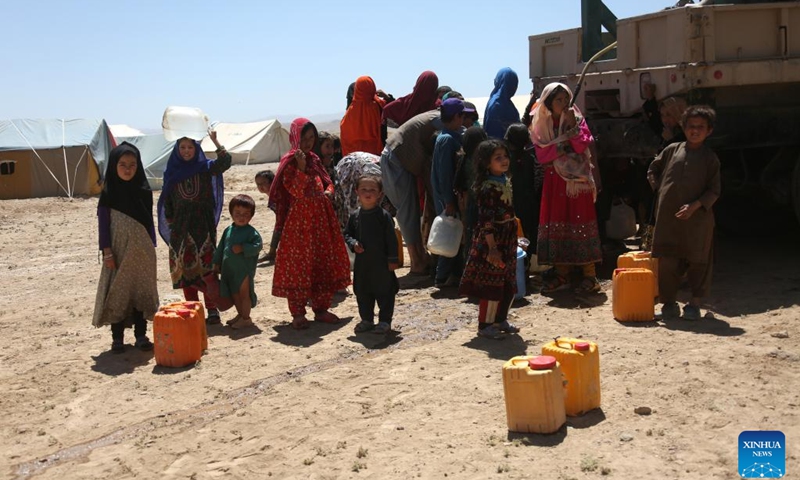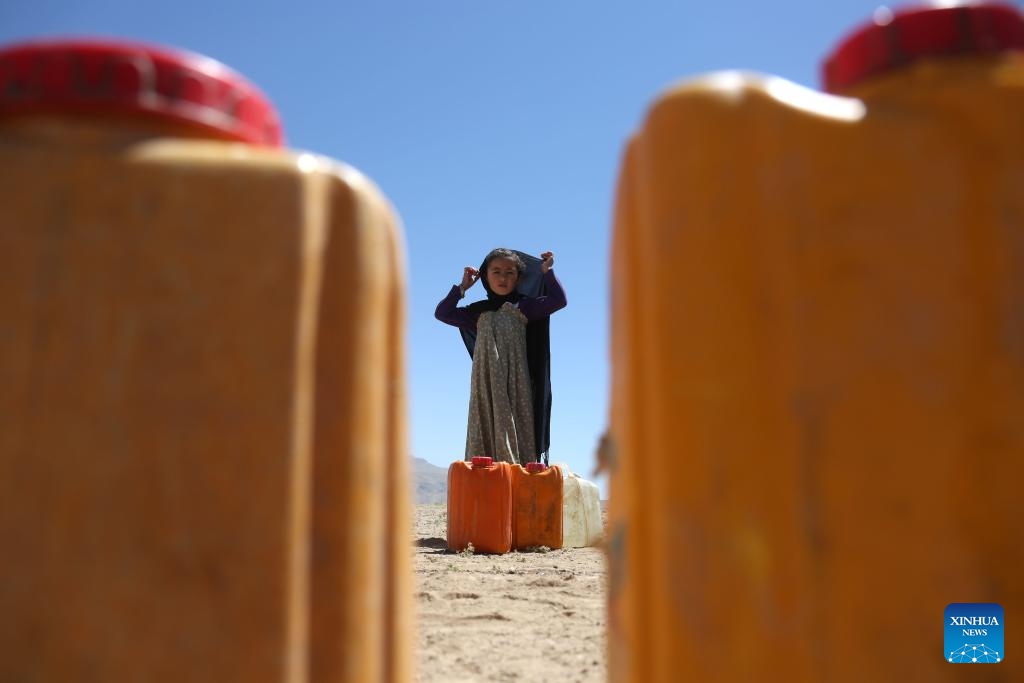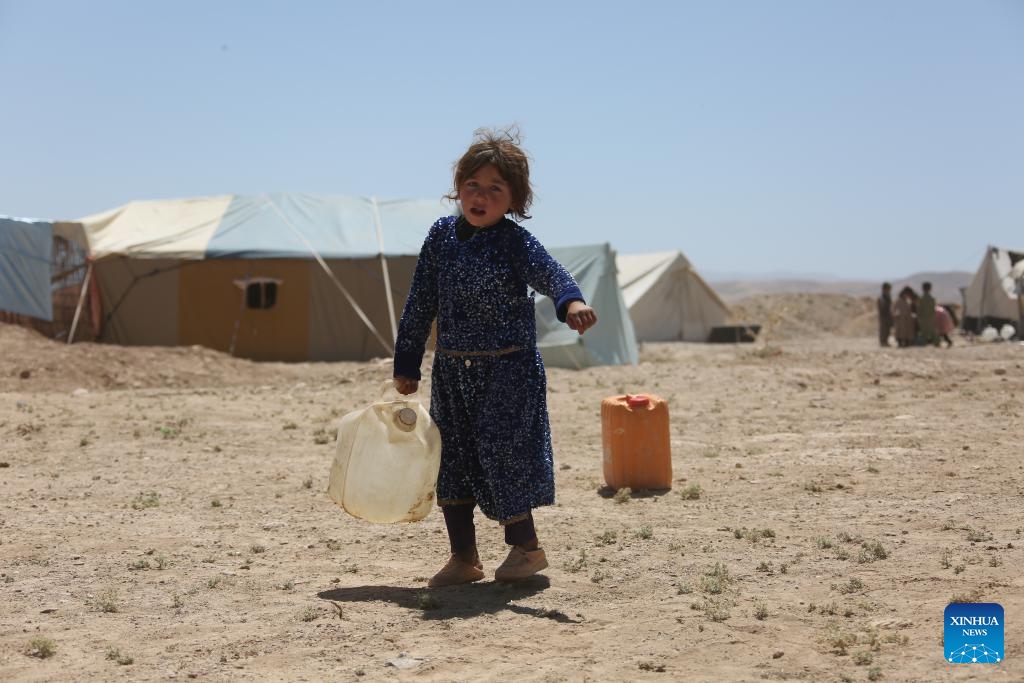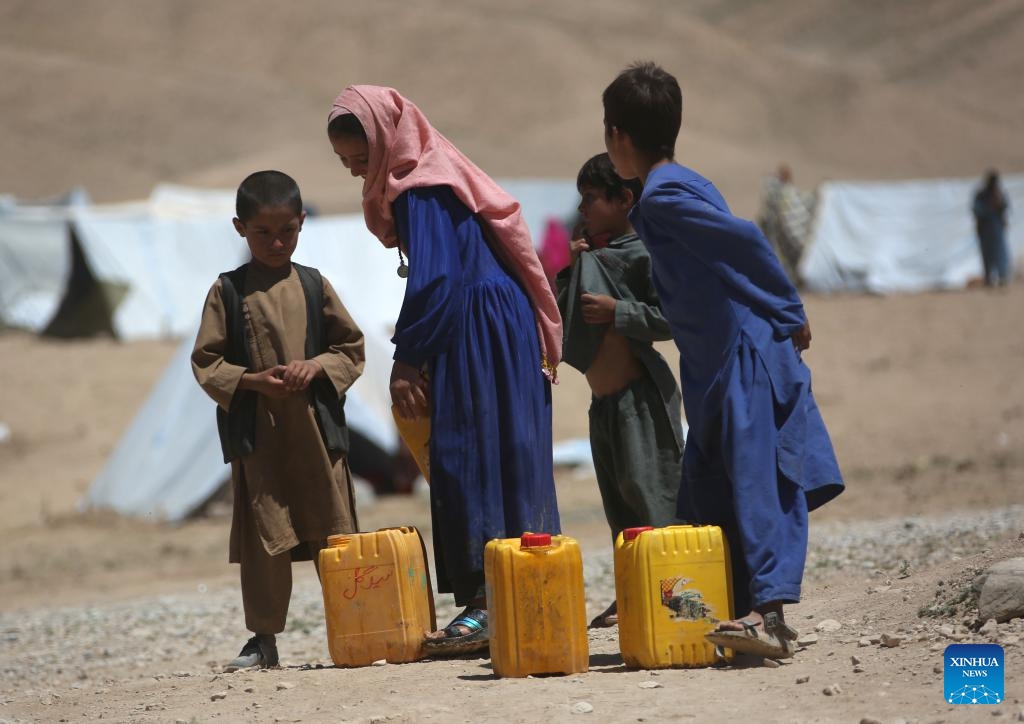
People fetch water from a water tank at a relocation site for flood survivors in Firoz Koh, Ghor province, Afghanistan, July 27, 2024. (Photo: Xinhua)

A girl stands in front of water barrels at a relocation site for flood survivors in Firoz Koh, Ghor province, Afghanistan, July 27, 2024. (Photo: Xinhua)

A girl carries a water barrel at a relocation site for flood survivors in Firoz Koh, Ghor province, Afghanistan, July 27, 2024. (Photo: Xinhua)

Children with water barrels are seen at a relocation site for flood survivors in Firoz Koh, Ghor province, Afghanistan, July 27, 2024. (Photo: Xinhua)
It took Mohammad Hassan three arduous days, trudging in a pair of worn-out sandals, to reach a relocation site after a catastrophic flood ravaged his village.
Hassan, the sole provider for his 10-member family, hails from the remote Ghor province in central Afghanistan. The province was struck by flash floods in mid-May, resulting in at least 50 fatalities and the destruction of more than 2,000 homes, according to the local disaster management authority.
"Heavy rains-triggered flash floods washed away everything -- houses and farmland; there was no place left (for us) to live; 600 families lived in our village, among whom 500 families were affected severely," Hassan recounted. "We were forced to leave our village and relocate here," he told Xinhua, standing on a mesa scattered with camps, about 8 km away from Firoz Koh, the provincial capital.
Some of the tents of varying sizes were distributed by the local government, while others were purchased by the flood survivors with borrowed money.
More than two months since the disaster, around 600 families from 10 different villages, all either destroyed or heavily damaged by the floods, are striving to rebuild their lives. Living in one of the most isolated parts of the impoverished country, they face the urgent challenges of finding new homes before the harsh winter sets in, accessing clean water and ensuring their children return to school.
Since May, Afghanistan has endured several deadly floods, causing over 400 deaths nationwide, with the northern Baghlan province drawing the most attention due to its highest number of casualties. For both local officials and flood-affected residents, the mountainous Ghor province has been largely overlooked.
Mullah Mohammad Mauoz, the provincial director for the disaster management authority of Ghor province, explained that initial assistance came from neighboring Herat province, an economic hub in western Afghanistan, followed by over 80 tents and other supplies from the national disaster management authority. "A mere amount of food and cash have been distributed to the affected people," Mauoz noted.
He did not shy away from criticizing the scant international attention and attributed it to the poor road conditions leading to the province. "Neither organizations nor people will bother themselves to travel in the province to check the problems people face here," he said.
However, a United Nations flash situation report released after the Ghor flood on May 20 noted that the World Health Organization had "transported a consignment of essential medicines, medical kits, tents, and 300 solar lights to Ghor province" and sent medical teams to the flood-affected areas. The United Nations High Commissioner for Refugees also said in June that it had reached 100 families with emergency tents and 349 with clothing.
Some local businessmen from Ghor have also stepped in to assist, renting water tanks to supply the displaced villagers with water from a nearby river, for drinking and other daily needs.
Despite concerns over its safety, the river water remains the only option for them. "The water we use daily is the water of the Hari River. It is not drinkable, but unfortunately, now we drink this water," said Burhanuddin Nazari, another flood-affected villager.
"People need drinking water, food and clothing," Nazari said, noting that the aid is woefully inadequate both at their relocation site and in other areas teeming with flood survivors.
Hassan also highlighted the destruction of the only two high schools and several primary schools in his hometown. According to the provincial education department, 62 schools across the province suffered severe damage during the floods.
"I was studying in fifth grade in Jandak village, but flash floods destroyed our school and we came here," said Mohammad Jan, a young boy from Hassan's village.
Having lost all his schoolbooks to the flood, the boy now spends his days passing time with other displaced children. He missed the end of last semester and faced uncertainty about the upcoming school term.
